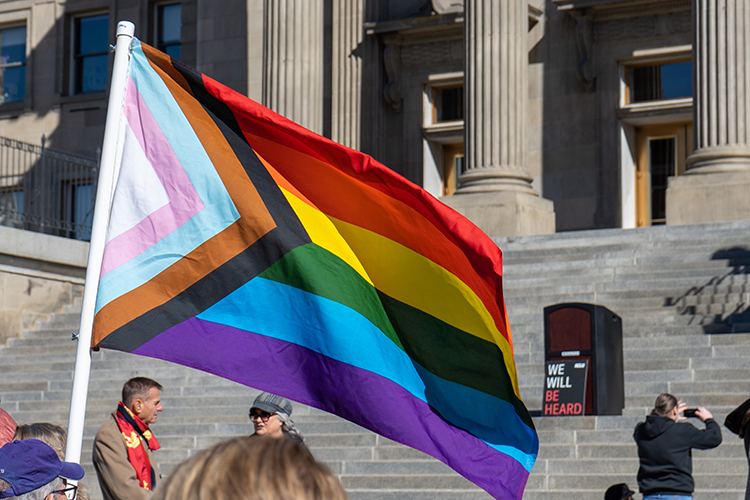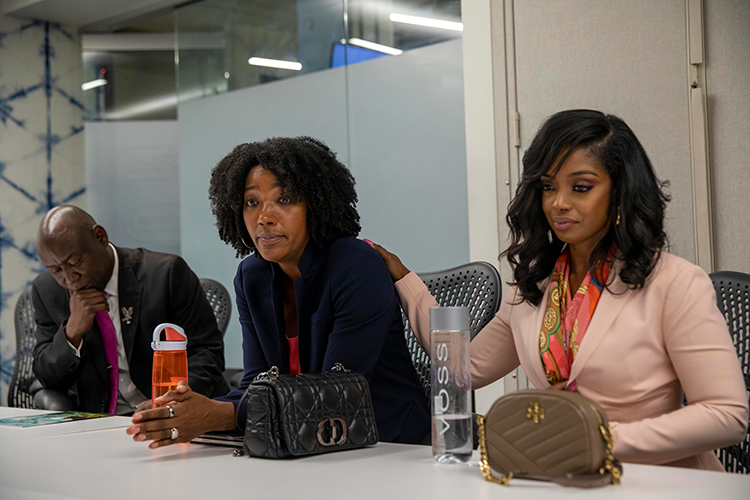SCOTUS declines to stay Idaho ban on gender-affirming care for minors

Protestors rallied in February 2023 in Boise, Idaho, to support transgender youth. The state legislature passed a bill banning gender-affirming medical care in May. (Venture Out Media/Shutterstock)
The Supreme Court on Monday cleared the way for Idaho to broadly enforce a ban on gender-affirming medical care for minors, the first time the justices have intervened on the contentious issue of transgender health treatments.
While the underlying case concerns the constitutionality of a ban on gender-affirming medical care for minors, the court’s order did not address the merits of the issue—only whether the law could take effect for now. The state’s restrictions will not immediately apply to the two transgender teens who sued the state.
Idaho legislators passed the bill, called the Idaho Vulnerable Child Protection Act, last May. The law bans puberty blockers, cross-sex hormones and certain surgeries for transgender adolescents. Idaho doctors who prescribe those treatments to transgender youth can face up to 10 years in prison.
Soon after Idaho Gov. Brad Little (R) signed the bill into law, two anonymous teen plaintiffs and their parents sued the state and asked a judge to block the law while the suit moved through the courts. In December, U.S. District Judge B. Lynn Winmill, a Bill Clinton appointee, granted their motion and temporarily blocked the ban from taking effect.
The state appealed, but the U.S. Court of Appeals for the 9th Circuit refused to stay the lower court’s opinion. Idaho then asked the Supreme Court to limit the injunction to just the two plaintiffs, thereby letting the ban take effect against all other trans youth in Idaho.
“Plaintiffs suffer no harm at all—let alone irreparable harm—if the injunction applies to them but not to others,” lawyers for the state wrote in legal filings.
The plaintiffs’ lawyers argued that limiting the injunction would out the teenage girls at the center of the suit. Because the law promises criminal repercussions for doctors, the only way the girls could receive care without a total injunction is if they reveal themselves as the lawsuit’s plaintiffs to staff at doctors’ offices and pharmacies every time they visited a doctor or sought to fill their prescriptions.
That argument did not sway the court.
“The plaintiffs face no harm from the partial stay the State requests,” wrote Justice Neil M. Gorsuch, who was joined by Justices Clarence Thomas and Samuel A. Alito Jr. “Even with it, the district court’s preliminary injunction will operate to prevent state authorities from taking any action to interfere with their ability to access the particular drug treatments they seek.”
In a statement, lawyers from the American Civil Liberties Union and the ACLU of Idaho, which is representing the plaintiffs, called the ruling “an awful result for transgender youth and their families.”
“Today’s ruling allows the state to shut down the care that thousands of families rely on while sowing further confusion and disruption,” they wrote. “Nonetheless, today’s result only leaves us all the more determined to defeat this law in the courts entirely, making Idaho a safer state to raise every family.”
Justice Brett M. Kavanaugh, joined by Justice Amy Coney Barrett, wrote separately to say they agreed with the decision to temporarily block the lower court ruling while litigation continues.
The court’s three liberal justices objected to Monday’s ruling, with Justice Ketanji Brown Jackson writing that the high court should have resisted “micromanaging” the lower courts.
Jackson, joined by Justice Sonia Sotomayor, added that the issue of gender-affirming medical care for transgender children is a “a serious and consequential matter, which, indeed, raises the profile of this case and the stakes of our intervention, for the law at issue here will have a significant practical impact on everyone it affects.”
Idaho Attorney General Raúl R. Labrador praised Monday’s ruling.
“Denying the basic truth that boys and girls are biologically different hurts our kids,” Labrador said in a statement. “No one has the right to harm children, and I’m grateful that we, as a state, have the power—and duty—to protect them.”
Nearly half the country has passed bans on gender transition care for minors, and most of those bans have wound up in court. Though several federal courts have blocked the bans from taking effect, three higher courts—the U.S. Court of Appeals for the 6th Circuit in Cincinnati, the U.S. Court of Appeals for the 11th Circuit in Atlanta, and the U.S. Court of Appeals for the 7th Circuit in Chicago—have allowed the bans to proceed.
While those cases have centered around the constitutionality of the bans, Idaho’s request is largely technical. In court filings, the state argued that the Supreme Court has never authorized universal injunctions and some circuit courts even prohibit them.
In legal filings, Idaho’s lawyers argued that the plaintiffs have no right to seek a universal injunction because they are only affected by parts of the ban. Both teenagers testified in court documents that they once took puberty blockers and currently take estrogen. Neither is currently seeking a surgical intervention, and neither wants access to testosterone. Trans adolescents and their families have not filed for class-action status, the lawyers argued, and should not be protected by the injunction.
“The Plaintiffs both want access to a single procedure,” the state’s representatives wrote, “but the injunction applies to all 20+ procedures that the (Vulnerable Child Protection Act) regulates.”
Lawyers have tried to make similar cases in Texas and Florida over laws that limit LGBTQ rights.
In 2022, after families with trans children sued the state of Texas over an order that directed the Department of Family and Protective Services to investigate them, a district court judge initially ruled that an emergency injunction only covered two specific families who sued. Eventually, the judge issued another injunction covering all Texas families who are members of PFLAG National, an organization uniting LGBTQ families.
And last year, after the restaurant Hamburger Mary’s won a temporary injunction against a drag ban in Florida, lawyers for that state argued that the injunction should only apply to Hamburger Mary’s and not other bars or restaurants.
In that case, Kavanaugh and Barrett emphasized that the question of whether lower courts can block enforcement of a law against those not involved in litigation is an important question that could warrant review in the future. But, Kavanaugh said, the Florida case was “an imperfect vehicle” for considering the question.
Though Idaho’s request focuses on the technical issue of universal injunctions, lawyers for the state also noted that the bans themselves merit legal review.
Last November, the ACLU, Lambda Legal and other nonprofit advocacy groups asked the Supreme Court to review a September 2023 decision by the 6th Circuit that upheld laws that bar transgender children in Tennessee and Kentucky from accessing puberty blockers and hormones.
The court has yet to say whether it will consider that case. Though legal experts believe the court will eventually rule on whether these bans violate the Constitution, the court has great flexibility in deciding when and how to take cases. The court receives thousands of petitions each year but takes fewer than 70 or so.
Typically, the high court takes cases when the lower courts have issued contradictory rulings. So far, the two circuit courts that have issued full and final opinions on the bans have agreed that they do not violate the Constitution. An 8th Circuit ruling that struck down Arkansas’s ban is on appeal.
The 9th Circuit tends to be more liberal, and if that court ultimately rules in favor of the trans teens, it will cause a circuit split.
That split, Idaho’s lawyers argue, “would present an optimal vehicle for the Court to resolve the important constitutional questions at issue.”



